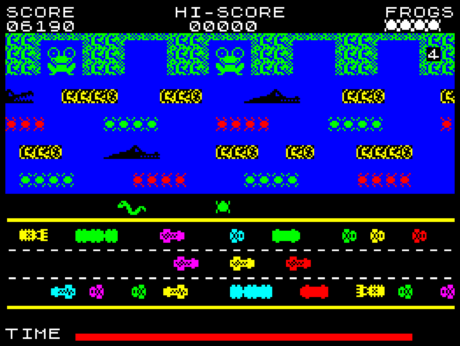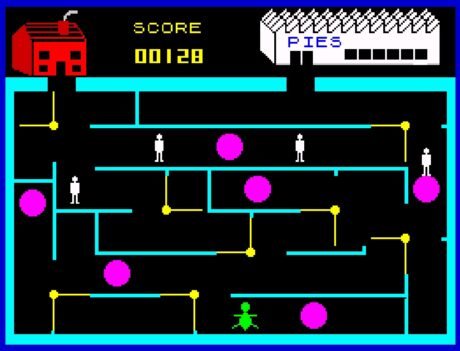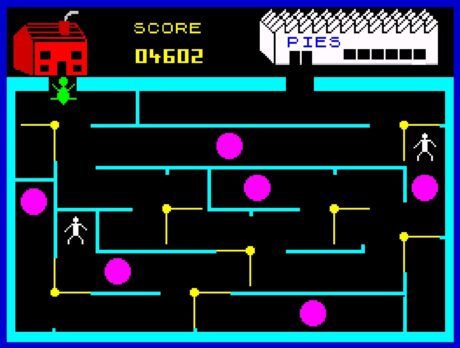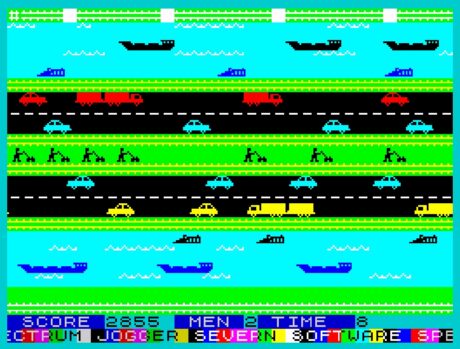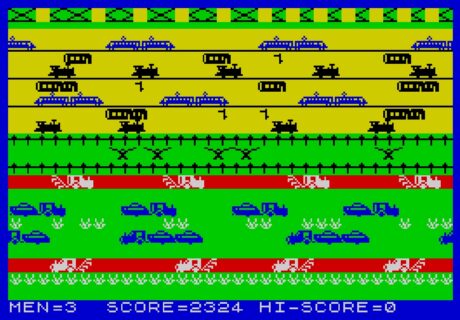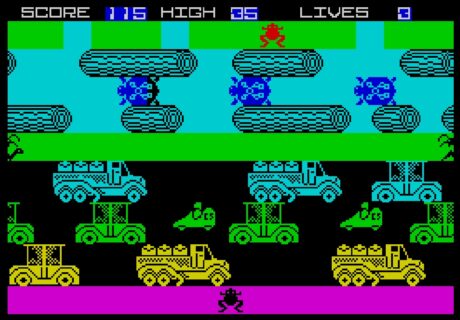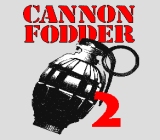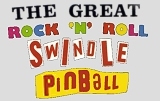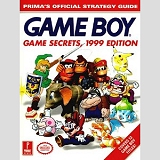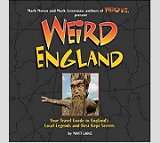The Great Leap Forward
If you consult the ZXDB Spectrum database, over the 43 years of the classic Sinclair computer’s history it identifies 64 clones of Konami’s 1981 arcade hit Frogger.
Until yesterday, remarkably, this was still the best one.
But happily, not any more.
Frogger RX, which you can get here for about £3.90, or better yet by supporting author Allan Turvey on Patreon (which also gets you free access to his entire back catalogue including more fantastic arcade ports for the Speccy of games like Lunar Rescue, Scramble, Asteroids, Pac-Man and Joust, along with a bunch of other subscriber-only stuff) is an astounding piece of work, as pixel-perfect to the coin-op as the Speccy could ever hope to achieve, and in 128K mode is also aurally near-indistinguishable from the original thanks to the superb musical efforts of scene stalwart Lee Bee.
(Hopefully also soon to contribute to another excellent Speccy arcade port that, like Frogger RX, I’ve been helping out with some playtesting for.)
But what’s surprising is just how dreadful all the Frogger games on the machine were before, considering the simplicity of the game design (single-screen, no enemy AI to code, not even diagonal movement) and the number of people who had a go at it.
Most of the iconic titles of the first arcade “Golden Era” of 1980-81 (your Centipedes, your Battlezones, your Galaxians, your Carnivals, your Defenders, your Moon Crestas etc) have enjoyed fairly respectable Speccy renditions by now, in some cases through a gradual evolution of improvement.
Donkey Kong, for example, started off pretty abysmally with Ocean’s infamous 1983 take (itself probably the best of a terrible bunch of early efforts which also included arguably not just the worst Speccy Kong but a very strong candidate for the accolade of the worst commercially-released videogame of all time).
But Ocean themselves had a much better stab at it a few years later, which was in turn recoloured by modders and then given a snazzy complete graphical overhaul, before being superseded late last year by a brilliant all-new version which continues to be tweaked and improved.
Pac-Man similarly came from ropey beginnings on the Speccy through a series of incremental steps until it now offers a whole selection of near-flawless options, from an actual emulated version running the real arcade ROMs (albeit with catastrophic colour clash) to two completely different near-perfect conversions with accurate ghost AI.
But Frogger on the Spectrum started off rubbish and stayed rubbish. Even discounting the bucketloads – and buckets are where they belong – of magazine type-ins and the like returned by ZXDB, the commercial releases were almost all rank rotten, and even more modern remakes pretty dire, with the sole exception of a very likeable (but never fully finished) port written in a form of BASIC with single-character-block graphics but which still managed to resemble the coin-op far more closely than anything before it.
DJL’s Froggy also had character-block graphics and a definite whiff of compiled BASIC about it, but it’s a speedy port with almost all of the coin-op’s features (only flies and otters are missing), slickly playable thanks to auto-repeating keys, and it gets seriously tricky by three or four stages in. But from then on, standards plummeted.
One could perhaps partially excuse slightly earlier releases like C-Tech’s spectacularly abysmal attempt, on the basis that the Spectrum had only just come out and at the start of 1983 coders were still having to learn how to program it from scratch.
(Some further mitigation was provided by it being effectively a budget game, coming on a tape which also included an equally grim version of Pac-Man for £5.50.)
But games which came out at the same time or later than Froggy – like Ocean’s take, Road Frog – were harder to forgive. It was only marginally better than C-Tech’s game and didn’t even let you move backwards, but it at least picked up the pace and got both the road and river onto the same screen.
Elfin Software’s borderline-unplayable Road Toad from the same year was a graphical tour de force by comparison.
(It was also remarkably reminiscent of the Frogger published by A’n’F, which had the advantage of sensible controls – QAOP rather than Road Toad’s idiotic ZXCV. Neither is credited to any named author in the ZXDB, and it looks very much like one is a slight rewrite of the other, cheekily sold to multiple companies.)
Hopper, from PSS, pulled off the difficult feat of being both less authentic and less enjoyable than the ZX81 version the same company had published previously, whose complete silence was also sonically preferable to the hideous noises emanating from the Speccy iteration.
Although a bit of kudos is due for adding a railway line blocking the central verge with parked or refersing steam trains as, we presume, some arch political commentary.
Let’s all of us, as a species, just quietly try to pretend that Terry’s Travels (released in the same year and at the same price as Lunar Jetman) didn’t happen.
In fact, no, let’s talk about it, because it’s absolutely mental bananas. It’s not even really a Frogger game in any conventional sense at all. There’s no time limit, no Lady Frog to rescue, no flies and no crocodiles. After a few screens of really strange road- and river-crossing (eg you don’t get carried along on the logs, you have to run so as not to fall off them) you end up in some sort of maze whose revolving doors move seemingly at random, and where even if you could rotate the doors to any position that you wanted, there’s no detectable route to either of the apparent exits – a house and a pie factory – other than through guards who kill you on contact.
There are no instructions, but after a LONG time you notice that the guards start to shuffle around slowly in an unfathomable manner (it’s definitely not random, but they don’t pursue you either), and if you run over the purple buttons a lot you can luck into a situation where they move out of the way and you can reach the buildings. The pie factory is a red herring, doing nothing, but if you make it to the red house the game declares “HOME SWEET HOME” and you go back to the first stage.
The thing is, though, that you shouldn’t bother. In the maze section you get points for pressing any of the direction keys, even if you’re just running into a wall and going nowhere. And since it’s easy to get the doors to a position where you and the guards can’t ever meet (indeed, you start in such a position), you can just put a rock on the keyboard, go out to a movie and rack up points until the score resets at 100,000.
But anyway. By 1984 the Speccy had seen games like Sabre Wulf, Skool Daze, All Or Nothing, Lords Of Midnight, Tornado Low Level, Pyjamarama, Match Day, Full Throttle, 3D Starstrike, Knight Lore, Combat Lynx, Psytron and Stop The Express, so the likes of Jogger from Severn Software were unambiguously unacceptable full-price fare.
(Although to be fair Jogger would have been pretty unacceptable if you’d spent an hour typing it in as a listing from Sinclair Programs, never mind handing over a big chunk of your hard-earned pocket money for it. Again you can’t move backwards, and it doesn’t even really include both types of section – there ARE river bits but they play exactly the same as the road bits, rather than having you ride on the ships or crocs, to all intents and purpose you just walk across the water with the graphic not even changed to look like you’re swimming. The only form of gameplay progression is that each new level adds an extra guy with a lawnmower to the central verge.)
Mouse from WB Software is extremely similar to Jogger except with a farming/train theme (featuring an odd railway system split equally between steam and painfully slow electric locomotives) and a down button.
(PRO PLAYING TIP: although they look like obstacles, the little huts and signal posts in between the train tracks are purely decorative and can be jumped over safely. Your mouse clearly has very powerful back legs.)
Mouse’s only notable feature/difference from Jogger is that as well as adding an extra bird to the central strip after each stage, it also increases the number of mouseholes you have to fill. When you get to level 5, where there are 12 holes to fill rather than the 4 of the first stage, the game freezes permanently in amazement.
WoS includes this screenshot of Walltone’s ridiculous Frog Hopper, in which we’ve gotten one frog safely home to the top of the screen, solely to prove that it IS in fact possible. Not a single gameplay video on YouTube depicts anyone even getting a frog to the central verge on level 1. Give it a try yourself if you want to ruin your afternoon.
(Nothing much happens if you succeed, level 2 seems identical in every detail.)
Yomp, by Virgin Games, which also includes a crude minefield-navigation section that plays like a version of Mined Out written for toddlers, was a belated (1984) Falklands War cash-in that was as entertaining and polished as it was tasteful.
(It was a game so infamously bad that its terribleness was used as the key plot point of Scorpion Software‘s sophisticated playground-piracy simulator The Rat.)
By the atrocious standards on show here, Frogger by Rabbit Software (again 1983, and running in 16K like most of the others) is actually kinda nice, with unique features like rows of parked cars, a little mini-maze section in the central reservation (which a snake slithers around in after stage 1) and the somewhat unique way you can die by crashing your frog into your spare lives at the bottom left corner. Sadly, however, the wildly over-sensitive control then sucks most of the potential fun out.
(Even more bizarrely, once you lose your first life the game abruptly ends after that round, because you temporarily “lose” a life while it’s in a frog home and now you no longer have enough left to fill all the slots and thereby qualify for the next round.)
And if we tell you that Frog Run by Anirog is one of the slickest and most professional of the Frogger clones that came out during the life of the Spectrum, while noting that it couldn’t even be bothered to make the river blue, you’ll probably get a good idea of the general picture this article is painting, if you hadn’t by now.
Really strangely, the Speccy didn’t even get a version of the officially-licenced Sega port for its American twin, the Timex TS2068, although that’s also no great loss. The 30 seconds it would have taken to make the tiny number of code tweaks required to make it run on the UK machine would have been a waste of effort that could have been more productively spent throwing trifles at panthers.
(FUN TRIVIA FACT! Frogger was also the first, and indeed as far as we know the only, arcade game ever to get a licenced port on the Spectrum’s predecessor, the ZX81. Embarrassingly, it’s a lot better than the TS2068 version.)
Even as late as 1990, in the machine’s dying days, people with no sense of human decency were still trying to get hard cash (albeit only £1.33) for the likes of Grebit, a game whose features and thrills are captured, in their entirety, in the video below.
And it’s a shameful indictment of the poor old rubber-keyed workhorse that the clear runner-up to Froggy as the best commercially-released Spectrum port of Frogger was CDS’s shoddy 1983 attempt Leapfrog, in which turtles vanish instantaneously from underneath your flippers without so much as a flicker of warning and the river graphics are just plain blobs of colour.
Even the crude original Parker Brothers conversion on the Atari VCS looked snappier, let alone the later and much prettier Starpath Supercharger cassette-tape release for the primitive console.
(Come to that, just about every videogaming platform on Earth, all the way down to the humble VIC-20, shamed the Spectrum for Frogger ports until this week.)
So as you enjoy Frogger RX on its own very considerable merits, take a moment to also appreciate just how startlingly far we’ve come in one massive bound. Truly, we are living in a better yesterday.
